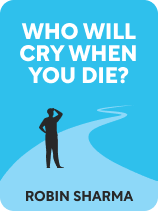

This article is an excerpt from the Shortform book guide to "Who Will Cry When You Die?" by Robin Sharma. Shortform has the world's best summaries and analyses of books you should be reading.
Like this article? Sign up for a free trial here .
What are the most common deathbed regrets? Is it possible to avoid them before you run out of time?
In his book Who Will Cry When You Die? Robin Sharma lays out the most common end-of-life regrets and proposes a plan on how to avoid them. Sharma says that the first step is to regain control of your life by finding your purpose.
Continue reading to learn what steps you can take to live a more fulfilling life.
Most People Live Lives They’ll Regret on Their Deathbeds
Sharma argues that humans have lost sight of what really matters in life. We’re caught up in unimportant details, such as career success and social status, rather than the big-picture considerations that make life worth living, like family, love, and community.
(Shortform note: Sharma provides a few examples of the big-picture priorities that make life worth living but mainly lets the reader decide what their own top priorities should be. Others specifically recommend the pursuit of purpose, proper use of time, maintenance of health, and strengthening of relationships as life’s most critical priorities.)
Sharma demands you ask yourself how you’ll feel about your life on your deathbed. Will you feel that you had the best impact possible on the world and those around you? Your answer might be “no,” and that’s okay. We’ll soon cover Sharma’s advice on changes you can make to respond affirmatively.
| The Most Frequent Deathbed Regrets Sharma insists that you ask yourself whether you’ll be content with the shape of your life on your deathbed. But it can be difficult to know by which metrics we’ll judge our happiness when we’re dying. To help us to answer this question, a palliative nurse gathered five of the most frequently expressed regrets people had at the end of their days. These are: 1. I should have been more authentic. 2. I should have prioritized work less. 3. I should have said how I felt more often. 4. I should have clung to important friendships. 5. I should have been happier. Rather than thinking broadly about whether or not you’ll be “happy” with your life as Sharma suggests, perhaps ask yourself if you’ll have any of the above regrets on your deathbed. This will help you to identify specific ways you can change your life for the better. |
Stop Wasting Your Life by Seizing Control of It
If you want to look back on your life with satisfaction rather than with deathbed regrets, Sharma says, first understand that you and only you are in control of your life. To lead a life you won’t regret, take action to make that possible—in other words, seize control of your life.
(Shortform note: Sharma tells you to take control of your life, but this can be difficult for someone with an external locus of control. The locus of control indicates how in-control of their own life a person feels: An external locus means a person doesn’t believe they have much control, while an internal locus indicates that person feels in control. You can shift your locus of control internally by taking responsibility for your actions, strengthening your belief in your agency, and viewing failure as a learning opportunity.)
To Seize Control, Set a Purpose
Understanding that you’re in control of your life is only helpful if you know what you want your life to look like, writes Sharma. To understand how to craft a life you’re proud of, figure out what your life’s purpose is. Your purpose is the special ability you were born with that you can use to make the world a better place. If you’re not sure of your purpose, Sharma suggests you ask yourself what strengths you have and how you can put them to good use—that’s your purpose. For instance, you might be an excellent piano player. Your purpose, then, could be to bring pleasure to audiences.
(Shortform note: Sharma recommends finding your purpose or special ability, but this is easier said than done—especially if, due to low self-esteem or lack of confidence, you struggle to see what your strengths and abilities are. If you struggle to define your purpose, consider reading more. Adolescents who read poetry and fiction have a greater sense of purpose because they access new ideas that can unlock the door to their purpose. You might also find your purpose by helping those who’ve suffered in the same ways you have. If, for instance, you’ve always struggled with anxiety, you might help others with it.)
Dedicating Your Life to a Purpose Leads to Happiness and Success
Working towards a purpose that benefits others is how you bring happiness and success into your life, claims Sharma. Happiness and success are not goals you strive toward—they’re atmospheres you build around yourself by acting in service of a selfless purpose.
| Are There Other Ways to Achieve Happiness and Success? Sharma’s belief that happiness and success are a side-effect of pursuing an altruistic purpose, rather than goals to strive toward in themselves, flies in the face of much self-help literature. Gretchen Rubin’s popular The Happiness Project, for instance, discusses optimizing various realms of your life, like work, parenting, and relationships, to achieve personal happiness. Similarly, Jack Canfield’s The Success Principles offers 67 principles that move you closer to personal success. That said, The Happiness Project includes many self-improvement suggestions that benefit others and that you can thus see as forms of altruism. Even The Success Principles recommends that you display appreciation for others, thereby adding happiness to the world. It seems both approaches—self-improvement and pursuing an altruistic purpose—spread both inner and outer joy, meaning you can implement both in your quest for happiness. |

———End of Preview———
Like what you just read? Read the rest of the world's best book summary and analysis of Robin Sharma's "Who Will Cry When You Die?" at Shortform .
Here's what you'll find in our full Who Will Cry When You Die? summary :
- Why most people end up leading lives they’ll regret
- How to seize control of your life and turn it into one you’ll look back on fondly
- How and why you should set intentional breaks in your daily life






